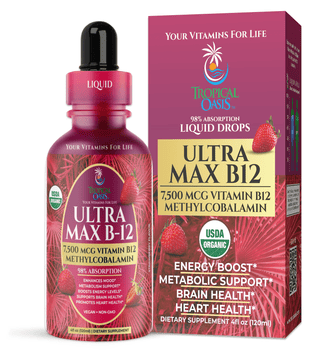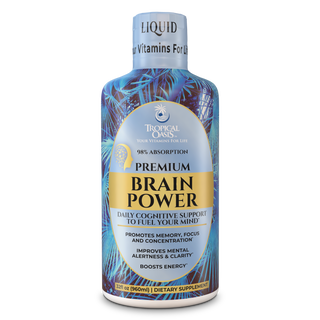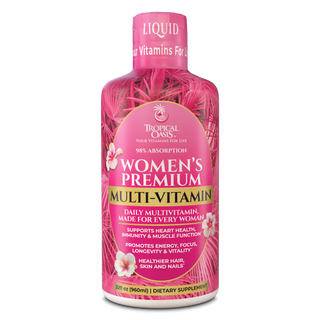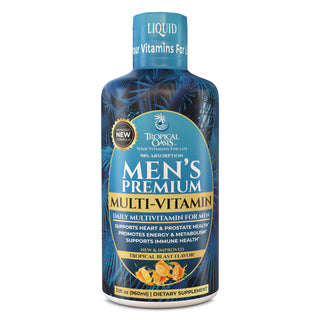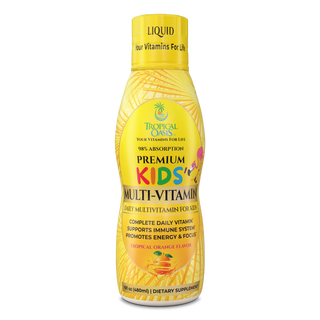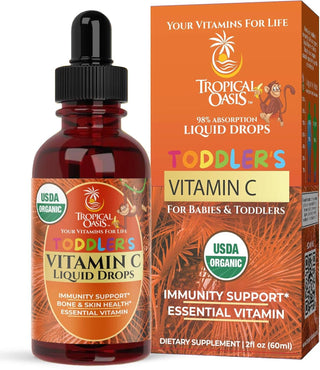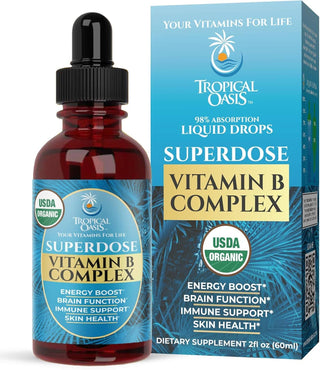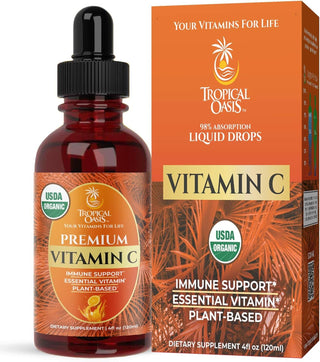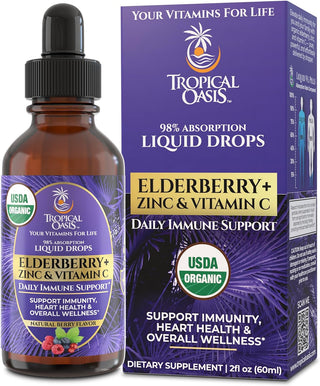Liquid Vitamins for Energy
Organic Liquid Vitamin Elderberry Drops with Vitamin C and Zinc for Adults & Kids
Regular price
$24.95
$19.96
- Unit price
- /per
You’re viewing 1-12 of 12 products
Frequently Asked Questions
Vitamins are vital for converting the food we eat into energy. They act as coenzymes, which means they help enzymes in the body to catalyze reactions that release energy from nutrients. For example, the B vitamins, particularly B12 and B6, are crucial for the metabolism of carbohydrates, fats, and proteins, which are our bodies' main energy sources. Additionally, vitamin D helps regulate calcium and phosphate in the body, which are necessary for maintaining energy and overall health. Without these essential vitamins, our bodies would not be able to produce and utilize energy, leading to fatigue efficiently and reduced physical and mental performance.
Certain vitamins are indispensable to optimal energy levels and overall health due to their specific roles in bodily functions and energy production. Here are some essential vitamins that can help boost your energy:
Vitamin B12
Vitamin B12, or cobalamin, is essential for red blood cell formation, neurological function, and DNA synthesis. It plays a pivotal role in converting carbohydrates into glucose, which is then used by the body as a primary source of energy. Additionally, vitamin B12 supports the maintenance of healthy nerve cells and helps produce myelin, the protective coating around nerves. A deficiency in B12 can lead to anemia, characterized by fatigue and weakness, and can also cause neurological issues such as numbness and tingling in the hands and feet.
Vitamin D
Vitamin D is crucial for bone health, immune function, and energy production. It facilitates the absorption of calcium and phosphorus from the gut, which are vital for maintaining strong bones and muscle function. Beyond its role in bone health, vitamin D has been shown to enhance muscle strength and reduce the risk of falls in older adults. Lack of vitamin D can result in tiredness, muscle weakness, and a condition known as osteomalacia, which leads to bone pain and fragility.
Vitamin C
Vitamin C, or ascorbic acid, is known for its potent antioxidant properties, which help protect cells from oxidative damage caused by free radicals. It plays a crucial role in synthesizing carnitine, a molecule essential for transporting fatty acids into the mitochondria and converting them into energy. Adequate vitamin C levels are necessary for maintaining energy, supporting immune function, and promoting skin health through collagen synthesis. Deficiency in vitamin C can lead to fatigue, weakened immunity, and scurvy, a condition characterized by bleeding gums and joint pain.
Vitamin B6
Vitamin B6, or pyridoxine, is involved in over 100 enzyme reactions, primarily related to protein metabolism. It is essential to produce neurotransmitters, such as serotonin, dopamine, and gamma-aminobutyric acid (GABA), which regulate mood, sleep, and cognitive functions. Vitamin B6 helps maintain mental clarity and focus by aiding in neurotransmitter synthesis, thereby supporting overall energy levels. Additionally, vitamin B6 is necessary for producing hemoglobin, the protein in red blood cells that carries oxygen throughout the body, ensuring that tissues and organs receive the oxygen they need to function optimally.
Incorporating energy-boosting vitamins into your diet can be achieved through various nutrient-rich foods. Here are some tips to help you ensure you're getting enough of these essential vitamins:
Eat A Balanced Diet
Include a variety of fruits, vegetables, whole grains, lean proteins, and healthy fats in your meals. This ensures you get a wide range of vitamins and nutrients for energy production and overall health. A balanced diet helps maintain steady energy levels throughout the day and supports all bodily functions.
Include Vitamin B12-Rich Foods
Foods such as fish, meat, poultry, eggs, milk, and other dairy products are excellent sources of vitamin B12. For vegetarians and vegans, fortified foods like cereals and nutritional yeast can help meet their B12 needs. Including these foods in your diet can prevent B12 deficiency, crucial for maintaining energy levels and preventing fatigue.
Get Enough Sunlight For Vitamin D
Spend time outdoors in sunlight to boost your vitamin D levels naturally. Aim for at least 10-30 minutes of midday sun exposure several times a week, depending on your skin type and location. Additionally, fatty fish (salmon, mackerel), egg yolks, and fortified dairy or plant-based milk should be included to ensure adequate vitamin D intake, vital for muscle function and energy metabolism.
Consume Vitamin C-Rich Foods
Incorporate citrus fruits (oranges, grapefruits), strawberries, bell peppers, broccoli, and Brussels sprouts into your meals. These are all rich sources of vitamin C, which supports immune function, aids in the absorption of iron from plant-based foods, and plays a role in collagen production for healthy skin and tissues. Regular consumption of vitamin C-rich foods can help maintain energy and prevent fatigue.
Add Vitamin B6-Rich Foods
Foods such as chickpeas, bananas, salmon, chicken, and fortified cereals are great sources of vitamin B6. Including these in your diet can help boost your energy levels by supporting protein metabolism and neurotransmitter production. Adequate vitamin B6 intake is essential for brain function, mood regulation, and maintaining healthy energy levels throughout the day.
Consider Supplements
If you have difficulty meeting your vitamin needs through diet alone, supplements can be an option. They can help fill nutritional gaps and ensure you receive the necessary vitamins for energy production. Consult a healthcare provider before starting any new supplement to ensure it's appropriate for your needs and avoid potential interactions with other medications or conditions.
Identifying when your body needs more energy-boosting vitamins can help you take proactive steps to improve your health. Here are some signs that you may be deficient in essential vitamins:
Chronic Fatigue
Persistent tiredness that doesn't improve with rest may indicate a vitamin deficiency like B12, D, or C. These vitamins are crucial for energy production and overall vitality. Without them, your body struggles to convert food into usable energy, leading to constant fatigue even after a good night's sleep.
Weakness And Muscle Cramps
A lack of vitamin D or B6 can lead to muscle weakness, cramps, and joint pain. These symptoms often indicate that your muscles aren't receiving the nutrients they need to function properly. Vitamin D is essential for muscle strength and function, while B6 supports protein metabolism and muscle repair.
Mood Changes
Deficiencies in vitamins B6, B12, and D can affect neurotransmitter production, leading to mood swings, depression, and irritability. Neurotransmitters like serotonin and dopamine, which regulate mood, rely on these vitamins for their synthesis. Ensuring adequate intake of these vitamins can help stabilize your mood and improve mental health.
Frequent Infections
Vitamin C is essential for a strong immune system. If you frequently fall ill, it could be a sign that you need more vitamin C to support your immune defenses. This vitamin enhances the production of white blood cells, which are crucial for fighting off infections and maintaining overall health.
Pale Or Yellowish Skin
A deficiency in vitamin B12 can lead to anemia, which may cause your skin to appear pale or slightly yellow. This happens because your body isn't producing enough healthy red blood cells necessary for delivering oxygen to your tissues. Anemia can also lead to symptoms like shortness of breath and dizziness, indicating the need for more B12.
While getting vitamins from natural food sources is ideal, supplements can be a helpful addition to ensure you meet your nutritional needs. Here are some tips for choosing vitamin supplements:
Consult With A Healthcare Professional
Before starting any supplement, it is important to talk to a doctor or a registered dietitian. They can determine if you need a supplement based on your health status, dietary habits, and nutritional deficiencies. Personalized recommendations can help you avoid unnecessary or harmful supplementation.
Choose High-Quality Brands
Look for reputable brands that have been tested for quality and purity. Check for third-party certifications from organizations like NSF International, USP, or ConsumerLab, which ensure the product meets strict standards for safety and efficacy. Choosing high-quality brands can help you avoid supplements with contaminants or incorrect dosages.
Read Labels Carefully
Pay attention to the ingredient list and the amount of each vitamin in the supplement. Ensure it doesn't contain unnecessary additives or fillers, which can cause adverse reactions or reduce the supplement's effectiveness. Understanding the label can help you make informed decisions about what you’re putting into your body.
Consider Your Specific Needs
Select supplements that match your specific health needs. For example, a vegetarian might need a vitamin B12 supplement since it's primarily found in animal products. If you have limited sun exposure, a vitamin D supplement could help you maintain adequate levels. Tailoring your supplements to your individual needs ensures you get the most benefit.
Check For Bioavailability
The body more readily absorbs some forms of vitamins. For instance, methylcobalamin is a highly bioavailable form of vitamin B12, meaning your body can use it more effectively. Choosing supplements with higher bioavailability can enhance their effectiveness and ensure you receive the intended health benefits.
Be Mindful Of Dosages
Avoid mega-doses of vitamins unless prescribed by a healthcare provider. Excessive intake of certain vitamins can lead to adverse effects, such as toxicity or interference with the absorption of other nutrients. Stick to the recommended daily allowances to maintain a balanced intake and avoid potential health risks.
Store Properly
To maintain their potency, keep your supplements in a cool, dry place. Heat, light, or moisture exposure can degrade the vitamins, reducing their effectiveness. Following the storage instructions on the label helps preserve the supplement's quality and ensures you receive the full health benefits.
Monitor For Interactions
Be aware of potential interactions if you're taking other medications or supplements. Some vitamins can interfere with the effectiveness of drugs or cause side effects when combined with other supplements. Your healthcare provider can help you navigate these interactions and adjust your regimen to ensure safety and efficacy.
In addition to dietary adjustments, certain lifestyle changes can enhance the absorption of vitamins and improve your overall energy levels:
Stay Hydrated
Adequate hydration is essential for nutrient absorption and energy production. Water helps transport vitamins and minerals throughout your body and supports metabolic processes, including digestion and waste elimination. Dehydration can impair these processes, leading to fatigue and decreased energy. Aim to drink at least 8 glasses of water daily, and more if you are physically active or in hot climates.
Get Regular Exercise
Physical activity stimulates blood flow and increases the efficiency of nutrient delivery to your cells. Regular exercise also boosts your metabolism, helping your body convert food into energy more effectively. Additionally, exercise enhances muscle function and endurance, contributing to overall energy levels. Incorporate a mix of aerobic, strength, and flexibility exercises into your routine for optimal benefits.
Prioritize Sleep
Quality sleep is crucial for energy restoration and nutrient utilization. During sleep, your body undergoes various repair and maintenance processes, including synthesizing proteins and hormones. Aim for 7-9 hours of uninterrupted sleep per night to ensure your body has enough time to repair and rejuvenate. Poor sleep can lead to decreased cognitive function, weakened immune response, and reduced energy levels.
Manage Stress
Chronic stress can deplete your body’s vitamins, particularly B vitamins, and negatively impact your energy levels. Stress increases the production of cortisol, a hormone that can interfere with metabolic processes and nutrient absorption. Practices such as meditation, yoga, and deep breathing exercises can help manage stress and improve your overall well-being. Reducing stress can lead to better energy balance and improved mental health.
Avoid Excessive Alcohol And Caffeine
While moderate consumption of alcohol and caffeine can be part of a balanced lifestyle, excessive intake can interfere with vitamin absorption and deplete your energy. Alcohol can impair the absorption of nutrients like B vitamins and vitamin C, while caffeine can lead to dehydration and disrupt sleep patterns. Limiting these substances can help maintain optimal vitamin levels and sustained energy. Aim for moderation and pay attention to how your body responds to these stimulants.
Sources:
- Sreenivas, S. (n.d.). Supplements and Energy: What to Know. WebMD. https://www.webmd.com/sleep-disorders/supplements-and-energy-what-to-know
- The most effective vitamins for boosting energy. (2019, October 23). Www.medicalnewstoday.com. https://www.medicalnewstoday.com/articles/326756
- Booth, S. (n.d.). Energy Boosters: Can Supplements and Vitamins Help? WebMD. https://www.webmd.com/balance/features/energy-boosting-supplements

